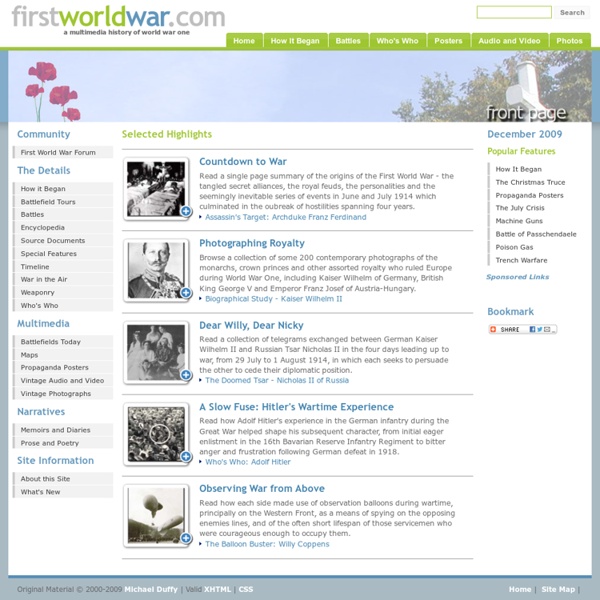First World War
Origins The First World War was caused by the destabilisation of the balance of power in Europe due to the rise of Germany. The war began in 1914 when Austria-Hungary invaded Serbia because of the assassination of an archduke. Countries had made alliances with each other, and soon most of Europe was at war. New Zealand was part of the British Empire, and when Britain declared war on Germany, in August 1914, that meant New Zealand was at war too. The two sides were called the Central Powers (Germany, Austria-Hungary) and the Allies, which included the British Empire, Russia and France.
The Great War: 80 years on
Monday, November 2, 1998 Published at 14:42 GMT The Great War: 80 years on It is 80 years since the armistice silenced the guns of World War I. The war lasted from 1914-18, claimed 10 million lives and forever changed the political map of Europe.
U.S. World War I Propaganda
All images are digitized | All jpegs/tiffs display outside Library of Congress | View All During World War I, the impact of the poster as a means of communication was greater than at any other time during history. The ability of posters to inspire, inform, and persuade combined with vibrant design trends in many of the participating countries to produce thousands of interesting visual works. The Library of Congress Prints & Photographs Division makes available online approximately 1,900 posters created between 1914 and 1920. Most relate directly to the war, but some German posters date from the post-war period and illustrate events such as the rise of Bolshevism and Communism, the 1919 General Assembly election and various plebiscites.
War dead: First and Second World Wars
This is an introductory guide to records of deaths of British and Commonwealth servicemen and women and also, to a lesser extent, civilians who died in the First and Second World Wars. This guide will help you to find out if the information you are looking for exists and, if it does, whether it is held at The National Archives or in other archives. What do I need to know before I start? Try to find out:the name of the person the approximate date of death the branch of the armed forces and the unit, if applicable What records can I see online?
World War I in Photos: Animals at War
When the war began, Europe's armies had an understanding of warfare that put the use of cavalry in high regard. Soon, however, the deadly terrain that evolved around trench warfare rendered cavalry attacks nearly useless on the Western Front. But the need for constant resupply, movement of new heavy weaponry, and the transport of troops demanded horse power on a massive scale -- automobiles, tractors, and trucks were relatively new inventions and somewhat rare.
Newspaper Pictorials: World War I Rotogravures, 1914-1919
This online collection is drawn from three primary sources: The War of the Nations: Portfolio in Rotogravure Etchings, a volume published by the New York Times shortly after the armistice that compiled selected images from their "Mid-Week Pictorial" supplements of 1914-19; Sunday rotogravure sections from the New York Times for 1914-19; and Sunday rotogravure sections from the New York Tribune for 1916-19. The War of Nations is particularly rich. This volume contains 1,398 rotogravure images with brief descriptive captions, broad organizational headings, and a table of contents; 32 maps that describe military engagements throughout the war; and a 3-page appendix that provides a chronology, statistics, treaty excerpts, and highlights of wartime events. Rotogravure collections were chosen for digitization since few quality originals exist in newspaper format due to paper deterioration.
War Poetry: Ted Hughes: 'Bayonet Charge'
I have already said my piece about the AQA GCSE poetry syllabus and what it calls the 'Conflict' cluster. (I take 'cluster' to be the AQA's decorous abbreviation of a more accurate military term which, alas, cannot be used on a family-friendly blog.) Now I will do my best to help those unfortunates brought to this site in search of information about one particular poem: Ted Hughes's 'Bayonet Charge'.
Officers Died
This information is intended as a memorial to those listed and has been compiled from various books, casualty lists, medal rolls, newspapers, and memorials. Some of the main sources are listed. If you can add any names/information please contact me. I am slowly transferring casualty rolls into this web site from the Other Ranks site.
World politics explainer: The Great War (WWI)
This is the first in a series of explainers on key moments in the past 100 years of world political history. In it, our authors examine how and why an event unfolded, its impact at the time, and its relevance to politics today. In October 1918, a young man was temporarily blinded on the Western Front and evacuated to hospital. For four long years, he had served in the German Army alongside 11 million men. Whether his blindness came from a gas attack or a sudden bout of nerves is still being debated.



